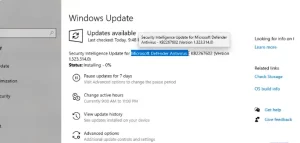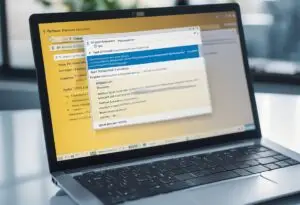How To Buy Antivirus for Laptop: A Professional Guide
Your Expert Guide to Purchasing Antivirus Software for Laptops

How To Buy Antivirus for Laptop? Antivirus software is essential for protecting laptops from malware and other online threats. With so many options available in the market, it can be challenging to choose the right one. In this article, we will guide you on how to buy antivirus for your laptop.
First, it is crucial to understand the need for antivirus software. Malware can cause significant damage to your laptop, including data loss, identity theft, and financial loss. Antivirus software provides a layer of protection against these threats by detecting and removing malicious software from your system.
When buying antivirus software, there are several factors to consider. These include operating system compatibility, antivirus features, pricing models, and where to buy the software. It is also essential to examine software reviews and ratings to ensure that you are purchasing a reliable and effective product.
Key Takeaways
- Antivirus software is essential for protecting laptops from malware and other online threats.
- When buying antivirus software, consider factors such as operating system compatibility, antivirus features, pricing models, and where to buy the software.
- Examining software reviews and ratings is crucial to ensure that you are purchasing a reliable and effective product.
Understanding the Need for Antivirus
Antivirus software is an essential tool for protecting laptops from various types of malware, viruses, and cyber threats. It is designed to detect, prevent, and remove malicious software that can damage or corrupt the system, steal personal information, and compromise the security of the device.
Without antivirus protection, laptops are vulnerable to a range of cyber threats, including viruses, worms, Trojans, spyware, adware, and ransomware. These threats can enter the system through various sources, such as email attachments, downloads, social media links, and infected websites. Once inside, they can cause a range of problems, from slowing down the system to stealing sensitive information.
Antivirus software works by scanning the system for any suspicious activity or files and then removing or quarantining them. It also provides real-time protection by monitoring the system for any potential threats and blocking them before they can cause any harm. Some antivirus programs also offer additional features, such as firewalls, parental controls, and anti-spam filters, to enhance the security of the device.
Overall, having antivirus software installed on a laptop is crucial for maintaining the integrity and security of the system. It provides peace of mind that the device is protected from cyber threats and allows users to browse the internet, download files, and use various applications without worrying about compromising their security.
Types of Antivirus Software

When it comes to buying antivirus software for a laptop, there are different types of antivirus software available. Each type of antivirus software has its own unique features and benefits. In this section, we will discuss some of the most common types of antivirus software.
Free Antivirus Software
Free antivirus software is a popular choice for many laptop users. As the name suggests, this type of software is available for free. However, it may not have all the features of a paid antivirus software. Free antivirus software may provide basic protection against viruses, malware, and spyware.
Paid Antivirus Software
Paid antivirus software is a comprehensive solution for protecting a laptop against various types of threats. It comes with advanced features such as real-time scanning, email protection, and firewall protection. Paid antivirus software may also provide additional features such as parental controls and identity theft protection.
Internet Security Suites
Internet security suites are a combination of antivirus software and other security tools. They provide protection against viruses, malware, spyware, and other online threats. Internet security suites may also include features such as anti-spam filters, anti-phishing protection, and online backup.
Cloud-Based Antivirus Software
Cloud-based antivirus software is a relatively new type of antivirus software. It uses cloud technology to provide protection against viruses and other online threats. Cloud-based antivirus software is lightweight and does not require regular updates. It is also easy to install and use.
In conclusion, there are different types of antivirus software available for laptops. Each type has its own unique features and benefits. It is important to choose the right type of antivirus software based on your specific needs and budget.
Factors to Consider When Buying Antivirus

When it comes to buying antivirus software for a laptop, there are several factors to consider. Here are some key factors to keep in mind:
1. Compatibility
The first thing to check is whether the antivirus software is compatible with the laptop’s operating system. For example, if the laptop runs on Windows, the antivirus software should be designed for Windows.
2. Features
Different antivirus software comes with different features. Some basic features that most antivirus software includes are malware protection, firewall, and email protection. However, some antivirus software may offer additional features such as parental controls, password manager, and VPN. It’s important to consider which features are necessary for the user’s needs.
3. Performance
Antivirus software can have an impact on the laptop’s performance. It’s important to choose antivirus software that doesn’t slow down the laptop’s performance. Some antivirus software comes with a performance impact rating, which can help in making an informed decision.
4. Price
Antivirus software comes at different price points. It’s important to consider the budget and choose software that provides the necessary protection at an affordable price. It’s also important to keep in mind that some antivirus software may offer a free version with limited features.
5. Reputation
It’s important to choose antivirus software from a reputable company. Look for reviews and ratings from independent sources to get an idea of the software’s effectiveness and reliability. Some well-known antivirus software providers include Norton, McAfee, and Kaspersky.
By considering these factors, users can choose the right antivirus software that provides the necessary protection for their laptop without compromising on performance or breaking the bank.
Operating System Compatibility
When buying antivirus software, it’s important to ensure that the software is compatible with your laptop’s operating system. This section will discuss the compatibility of antivirus software with the three most popular operating systems: Windows, MacOS, and Linux.
Windows
Windows is the most widely used operating system for laptops, and as such, most antivirus software is designed to be compatible with it. When purchasing antivirus software for a Windows laptop, it’s important to ensure that the software is compatible with the specific version of Windows that you’re using. For example, some antivirus software may be compatible with Windows 10, but not with Windows 7 or 8.
MacOS
MacOS is the operating system used by Apple’s MacBook laptops. While MacOS is generally considered to be more secure than Windows, it’s still important to have antivirus software installed. When purchasing antivirus software for a Mac, it’s important to ensure that the software is compatible with the specific version of MacOS that you’re using. Some antivirus software may be compatible with MacOS 10.15 Catalina, but not with older versions of MacOS.
Linux
Linux is an open-source operating system that is used by some laptop users. While Linux is generally considered to be more secure than Windows and MacOS, it’s still important to have antivirus software installed. When purchasing antivirus software for a Linux laptop, it’s important to ensure that the software is compatible with the specific version of Linux that you’re using. Some antivirus software may be compatible with Ubuntu, but not with other Linux distributions.
In summary, when purchasing antivirus software for a laptop, it’s important to ensure that the software is compatible with the specific operating system and version that you’re using. This will ensure that the software is able to provide the best possible protection for your laptop.
Examining Antivirus Features
When purchasing an antivirus software for a laptop, it is important to examine the features that the software offers. Here are some key features to consider:
Real-Time Scanning
Real-time scanning is a feature that constantly monitors the system for any malicious activity. It scans all incoming and outgoing files and detects any malware in real-time. This feature is essential for protecting the laptop from any potential threats that may be missed during scheduled scans.
Automatic Updates
Antivirus software should always be up-to-date with the latest virus definitions to ensure maximum protection against new threats. Automatic updates are a convenient feature that ensures the software is always updated without the need for manual intervention. It is important to ensure that the software has this feature and that it is enabled.
Firewall Protection
Firewall protection is a feature that monitors incoming and outgoing network traffic and blocks any unauthorized access attempts. It helps to prevent hackers from gaining access to the system and stealing sensitive information. It is important to ensure that the software has this feature and that it is enabled.
Email Protection
Email protection is a feature that scans email attachments and links for any potential threats. It helps to prevent the spread of malware through email and protects the system from any potential threats. It is important to ensure that the software has this feature and that it is enabled.
Web Protection
Web protection is a feature that blocks access to malicious websites and prevents the download of any potentially harmful files. It helps to prevent the spread of malware through the internet and protects the system from any potential threats. It is important to ensure that the software has this feature and that it is enabled.
By examining these key features, users can ensure that they are purchasing an antivirus software that provides comprehensive protection against potential threats.
Checking Software Reviews and Ratings
When looking to buy antivirus software for a laptop, it is important to check software reviews and ratings to ensure that the software is effective at protecting against viruses and malware. Here are some tips to keep in mind when checking software reviews and ratings:
Look for Independent Reviews
When checking software reviews, it is important to look for independent reviews from reputable sources. Some examples of reputable sources include PCMag, Consumer Reports, and Tom’s Guide. These sources provide unbiased reviews and ratings based on their own testing and evaluation of the software.
Consider the Overall Rating
When looking at software reviews, it is important to consider the overall rating of the software. A high overall rating indicates that the software is effective at protecting against viruses and malware. However, it is important to also read the individual reviews to get a better understanding of the software’s strengths and weaknesses.
Read Individual Reviews
Reading individual reviews can provide valuable insights into the software’s effectiveness at protecting against viruses and malware. Look for reviews that mention the software’s ability to detect and remove viruses and malware, as well as its ease of use and overall performance.
Consider User Reviews
In addition to independent reviews, it is also important to consider user reviews. User reviews can provide valuable insights into the software’s ease of use, performance, and overall effectiveness. Look for software that has a high number of positive user reviews, as this indicates that the software is effective at protecting against viruses and malware.
By following these tips and checking software reviews and ratings, you can ensure that you are purchasing antivirus software that is effective at protecting your laptop against viruses and malware.
Understanding Pricing Models
When it comes to buying antivirus software for a laptop, there are typically two pricing models: free and paid. Each model has its own advantages and disadvantages, and it is important to understand them before making a decision.
Free Versions
Free antivirus software is widely available, and it can be a good option for those who are on a tight budget. These versions often provide basic protection against viruses, malware, and spyware, but they may not offer the same level of protection as paid versions.
One of the main advantages of free antivirus software is that it doesn’t cost anything. This can be especially beneficial for those who only need basic protection or who are on a tight budget. However, free versions often come with limitations, such as fewer features, limited customer support, and frequent ads.
Paid Versions
Paid antivirus software provides more comprehensive protection than free versions, offering features like firewall protection, email scanning, and real-time monitoring, making it particularly valuable for users engaging in sensitive online activities such as banking and shopping.
Where to Buy Antivirus Software
When it comes to purchasing antivirus software for laptops, there are two main options: online stores and physical stores. Each option has its own advantages and disadvantages, so it’s important to consider both before making a decision.
Online Stores
Online stores are a convenient option for those who prefer to shop from the comfort of their own home. There are many online stores that offer antivirus software, including the following:
| Online Store | Pros | Cons |
|---|---|---|
| Amazon | Wide selection of products, competitive pricing | May be difficult to determine if a seller is reputable |
| Best Buy | Free shipping on many products, in-store pickup available | Limited selection compared to other online stores |
| Newegg | Large selection of products, competitive pricing | May not offer free shipping on all products |
One of the biggest advantages of purchasing antivirus software from an online store is the convenience. Customers can browse a wide selection of products, compare prices, and make a purchase without ever leaving their home. However, it can be difficult to determine if a seller is reputable, so it’s important to read reviews and do research before making a purchase.
Physical Stores
Physical stores are a good option for those who prefer to see and touch a product before making a purchase. There are many physical stores that offer antivirus software, including the following:
| Physical Store | Pros | Cons |
|---|---|---|
| Best Buy | Wide selection of products, knowledgeable staff | Limited selection compared to online stores |
| Staples | In-store pickup available, knowledgeable staff | Limited selection compared to online stores |
| Office Depot | In-store pickup available, knowledgeable staff | Limited selection compared to online stores |
One of the biggest advantages of purchasing antivirus software from a physical store is the ability to see and touch a product before making a purchase. Customers can ask questions and get advice from knowledgeable staff members. However, physical stores may have a more limited selection compared to online stores, and customers may need to travel to a store to make a purchase.
Ultimately, the decision of where to buy antivirus software for a laptop will depend on personal preferences and needs. It’s important to consider both online and physical stores before making a decision.
Installation Process
After purchasing an antivirus software for a laptop, the next step is to install it. The installation process may vary depending on the antivirus software, but there are general steps that can be followed.
First, the user needs to download the antivirus software from the official website of the vendor. The user should make sure to download the version that is compatible with their laptop’s operating system. Some vendors may offer a free trial version of their software, which can be used to test the software before committing to a purchase.
Once the software has been downloaded, the user needs to run the installer. The installer may be an .exe file or a .msi file, depending on the software. The user should double-click on the installer file to start the installation process.
During the installation process, the user may be prompted to agree to the software’s terms and conditions. It is important to read these terms and conditions carefully before agreeing to them. The user may also be asked to choose the installation location, which is where the software will be installed on the laptop.
After the installation is complete, the user needs to activate the antivirus software. This may involve entering a license key or creating an account with the vendor. The user should follow the instructions provided by the vendor to activate the software.
It is important to keep the antivirus software up to date by regularly installing updates. The software may automatically check for updates and prompt the user to install them. Alternatively, the user may need to manually check for updates by opening the software and navigating to the update section.
Post-Purchase Considerations
After purchasing antivirus software for a laptop, there are a few important considerations to keep in mind to ensure the software is functioning properly and providing the necessary protection.
Regular Scans: One of the most important things to do after installing antivirus software is to run regular scans of the laptop. This will help detect any viruses or malware that may have infected the system. Most antivirus software allows users to schedule scans at regular intervals, such as daily or weekly. It is recommended to schedule a scan at least once a week to ensure the laptop is free of any threats.
Software Updates: Antivirus software providers regularly release updates to their software to address any new threats or vulnerabilities that may have been discovered. It is important to keep the software up to date to ensure it is providing the best possible protection. Most antivirus software will automatically check for updates and install them when available. However, users should also check for updates manually on a regular basis to ensure the software is up to date.
Firewall: In addition to antivirus software, it is important to have a firewall installed on the laptop. A firewall helps to block unauthorized access to the laptop from the internet or other networks. Most antivirus software includes a firewall as part of the package, but users should ensure it is turned on and properly configured.
Safe Browsing: Even with antivirus software and a firewall in place, it is still important to practice safe browsing habits. This includes avoiding suspicious websites, not clicking on links in unsolicited emails, and not downloading files from unknown sources. Users should also be cautious when using public Wi-Fi networks as they can be vulnerable to hacking attempts.
Additional Security Measures: For added security, users may want to consider additional measures such as using a virtual private network (VPN) when browsing the internet or using two-factor authentication for online accounts. These measures can help provide additional protection against threats and keep personal information secure.
By following these post-purchase considerations, users can ensure their laptop is properly protected against threats and vulnerabilities.

Credit: Youtube
FAQs Of How To Buy Antivirus for Laptop?
What are the best antivirus options for a laptop?
There are several antivirus options available for laptops, including Norton, McAfee, Bitdefender, Kaspersky, and Avast. Each of these options has its own strengths and weaknesses, so it’s important to research and compare them before making a purchase.
Where can I purchase antivirus software for my laptop?
Antivirus software can be purchased from various sources, including online retailers like Amazon, Best Buy, and Newegg, as well as directly from the antivirus software provider’s website.
How much does virus protection for a laptop cost?
The cost of virus protection for a laptop can vary depending on the brand and level of protection desired. Basic antivirus software can cost as little as $20 per year, while more advanced options can cost upwards of $100 per year.
Is it necessary to purchase antivirus software for a laptop?
While it is not strictly necessary to purchase antivirus software for a laptop, it is highly recommended. Without antivirus protection, laptops are vulnerable to malware and other security threats that can compromise personal and sensitive information.
Which antivirus software is recommended for laptops?
There is no one-size-fits-all answer to this question, as the best antivirus software for laptops can vary depending on individual needs and preferences. However, some of the top-rated options include Norton, McAfee, and Bitdefender.
Do laptops come with antivirus software pre-installed?
Some laptops may come pre-installed with basic antivirus software, but it is typically not sufficient for comprehensive protection. It is recommended to purchase and install a more advanced antivirus software for optimal security.

I am a technology writer and blogger based in the USA. I have over 5 years of experience writing about the latest trends and innovations in the tech industry, with a focus on topics like artificial intelligence, cybersecurity, and social media.



